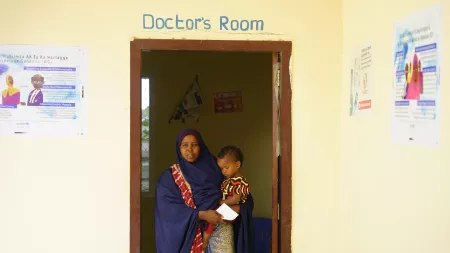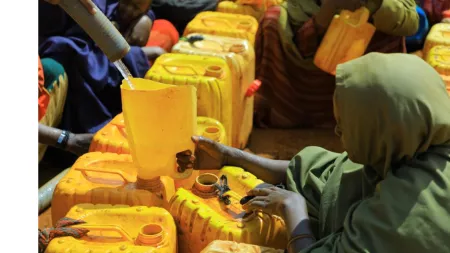Mogadishu, Somalia, July 2024 – Across Somalia, prolonged rainfall and flash floods have caused a surge in cholera, hitting displaced women and children the hardest. Between January and June 2024, 123 lives were lost. CARE-supported health facilities treated over 11,925 acute diarrhea cases from January to May 2024, with more than 60% of patients being children under five. Destroyed water and infrastructure have left thousands without clean water and sanitation.
Flooding, which has mostly affected displaced women and children, threatens to worsen as communities now lack access to clean water.Abdifarhan Gure, CARE Somalia Deputy Country Director of Programs.
“Flooding, which has mostly affected displaced women and children, threatens to worsen as communities now lack access to clean water," said Abdifarhan Gure, CARE Somalia Deputy Country Director of Programs. “We fear that the cases might increase as we seasonal rains and flash floods are expected to affect at least 770,000 people in the next few months."
We were lucky as she was given all the medical health support she needed until she recovered, many other people from our community have shown the same symptoms and some have lost their lives or loved ones.Halima, a mother from Somalia, on her youngest child being diagnosed with cholera.
Halima’s family was affected by the recent floods as her youngest child fell ill. “The floods destroyed our toilets and as a result, water sources became contaminated as people had to go to the bush to relieve themselves. Unfortunately, my child started vomiting, and had severe diarrhea and fever which left her weak. She lost a lot of weight as well.

We were not sure what was causing this but after we visited a nearby health facility, the health workers informed us that my child had cholera. We were lucky as she was given all the medical health support she needed until she recovered, many other people from our community have shown the same symptoms and some have lost their lives or loved ones.”
CARE and its national partners, WARDI and GREDO, are working tirelessly to provide the affected communities with medical services, clean water, and sanitation facilities.
I have seen the devastating impact of cholera firsthand, as entire families suffering from acute watery diarrhea diseases come to the health center.Hawa Miris, a qualified nurse from CARE's partner organisation GREDO in Hudur, Southern Somalia.
"I have seen the devastating impact of cholera firsthand, as entire families suffering from acute watery diarrhea diseases come to the health center,” said Hawa Miris, a qualified nurse from CARE partner GREDO in Hudur, Southern Somalia. "We are working tirelessly to provide care, comfort, and hope to those affected knowing that our efforts make a real difference in people's lives."
The underfunding of the Somalia Humanitarian Response plan, with only 23% of the needed funds received, is a significant concern. It is essential to scale up support to address the growing needs and prevent further loss of life.
We are working tirelessly to provide care, comfort, and hope to those affected knowing that our efforts make a real difference in people's lives.Hawa Miris.
CARE and partners' response
CARE Somalia, through a network of more than 100 fixed and mobile health facilities in Puntland, Galmudug, Jubaland, and Hirshabelle provides lifesaving medical supplies and treatment to communities affected by acute watery diarrhea and cholera. CARE also trains health workers equipping them with technical skills to manage the response in affected areas. To increase access to clean water, CARE Somalia, through USAID, is providing emergency water trucking services to the affected communities.
For media inquiries, please contact [email protected].
